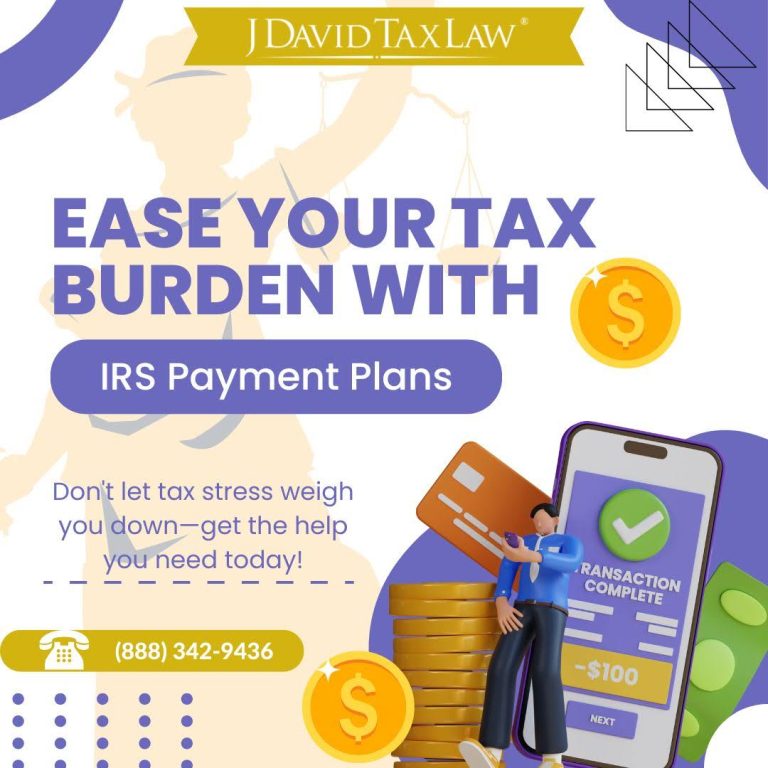
Yes, a tax attorney can negotiate with the IRS on your behalf,reducing penalties and resolving tax debt.Call our IRS tax relief attorney at (888) 342-9436.





Timely and accurate management of taxes not only ensures legal compliance but also prevents potential financial complications. One significant aspect of tax management is understanding the options available when you are unable to pay your taxes in full by the deadline. This is where IRS payment plans come into play, providing a structured way for taxpayers to clear their dues without undue financial burden.
Taxpayers can use IRS payment plans to pay their tax debt in installments rather than making a single large payment. These plans are designed to be flexible. It aims to accommodate the financial realities of taxpayers while ensuring that the IRS collects owed taxes. The effectiveness of these plans often hinges on the expertise with which they are handled. This is the reason why you must turn to tax debt professionals.
IRS payment plans, also known as installment agreements, allow taxpayers who owe taxes and cannot make an immediate payment to pay over time. These plans are formal agreements negotiated with the IRS that spread the tax debt into smaller, manageable monthly payments.
This arrangement continues until the entire debt is paid off. The primary advantage of such plans is that they prevent more severe consequences like liens or levies, which can arise from unpaid taxes.
The IRS offers several types of payment plans, catering to the varied financial situations of taxpayers:
Short-term payment plan: Available for individuals who can pay their balance in 180 days or less. There are no setup fees for this plan.
Long-term payment plan (installment agreement): Suitable for those who need more than 180 days to clear their debt, up to 10 years or more. This can be set up as a direct debit from a bank account, which often lowers the setup fee.
Partial payment installment agreement: This plan is for taxpayers who can’t afford to pay their total tax debt before the tax debt reaches the 10 year statute of limitations, at which point it expires.. It allows them to make a series of smaller payments over time or monthly payment options.
Guaranteed installment agreement: Available to taxpayers owing less than $10,000, excluding penalties and interest. This plan generally doesn’t require a detailed financial statement.
By breaking down a large tax debt into smaller, more manageable payments, IRS payment plans can significantly reduce the financial stress associated with lump sum payments. They provide a predictable structure to manage debt. It helps individuals and businesses to budget more effectively and avoid unexpected financial strains.
For business owners and taxpayers, these plans can be particularly advantageous. A varied economic landscape means that residents can sometimes face unpredictable financial pressures. The flexibility of IRS payment plans can help stabilize their finances and prevent the accrual of further penalties.
Not all taxpayers can avail of the payment plan options from the IRS. To qualify, taxpayers must meet the following criteria and follow these steps:
Assess Your Tax Situation: Before initiating the application process, confirm the total amount you owe by checking your tax documents or contacting the IRS. This will determine which payment plan you qualify for.
Ensure All Tax Returns Are Filed: The IRS requires that all tax returns are filed before setting up a payment plan. If you have any unfiled returns, you must complete these first.
Gather Necessary Financial Information: Compile details about your financial situation, including your income sources, monthly expenses, assets, and liabilities. This information is crucial, especially if you owe more than $50,000 or if you are applying for a payment plan that requires a financial statement.
Apply for the Payment Plan: You can apply for an IRS payment plan online, by phone, or by mail. The online application process is the quickest:
Visit the IRS website and go to the Payment Plan section.
Use the IRS’s Online Payment Agreement tool if you owe $50,000 or less in combined tax, penalties, and interest.
If you owe more than $50,000, you will need to fill out and mail Form 433-F along with your Installment Agreement Request (Form 9465).
Review Terms and Set Up Payments: Once your application is approved, review the terms of the agreement. This includes the monthly payment amount and due dates. Set up a direct debit or other payment method to ensure payments are made on time.
Confirm Agreement: Ensure you receive confirmation from the IRS that your payment plan has been set up. This may come in the form of a letter detailing your payment plan terms.
Partnering with a specialized tax law firm in Charlotte can significantly enhance the process and benefits of setting up a payment plan with the IRS. Our comprehensive understanding of tax laws and IRS procedures means we can tailor a payment plan that fits your financial situation. Moreover, our negotiation skills can be crucial in securing terms that might not be readily accessible to individuals managing the process alone.
By taking advantage of IRS payment plans and working with tax experts, taxpayers can maintain compliance with the IRS while managing their finances in a more balanced way. It’s essential to approach tax debts proactively—waiting too long to address outstanding taxes can lead to complications that are much harder to resolve.
Our tax relief attorneys specialize in tax problems and tax debt resolutions
Get started with a 100% free consultation

Yes, a tax attorney can negotiate with the IRS on your behalf,reducing penalties and resolving tax debt.Call our IRS tax relief attorney at (888) 342-9436.

Missed the April 15 Tax Day 2025 deadline? Learn about IRS penalties, late payment relief, and how to settle your tax debt. Call us at (888) 342-9436.

IRS grants a tax deadline extension to California wildfire victims.Can you delay filing and payment until Oct. 15, 2025?Call at (888) 342-9436 to find out.
Get IRS Tax Assistance Within 24 Hours